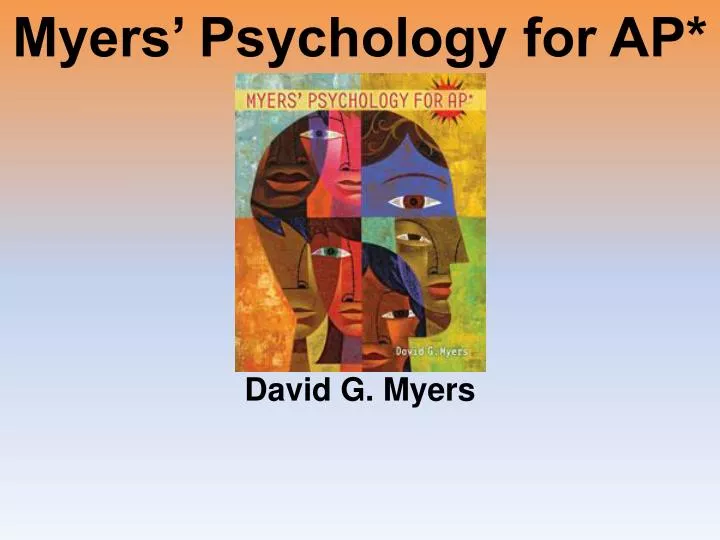Ap Psychology Notes Myers 8th Edition Chapter 17
![]() Download
Download

Skip this Video
Loading SlideShow in 5 Seconds..
Myers' Psychology for AP* PowerPoint Presentation


Myers' Psychology for AP*
Download Presentation
Myers' Psychology for AP*
- - - - - - - - - - - - - - - - - - - - - - - - - - - E N D - - - - - - - - - - - - - - - - - - - - - - - - - - -
Presentation Transcript
-
Myers' Psychology for AP* David G. Myers
-
Unit 1:Psychology's History and Approaches
-
Unit Overview • What is Psychology? • Contemporary Psychology Click on the any of the above hyperlinks to go to that section in the presentation.
-
What is Psychology?
-
Psychology's RootsPrescientific Psychology • Ancient Greeks • Socrates • Plato • Aristotle
-
Psychology's RootsPrescientific Psychology • Rene Descartes - Dualism • Francis Bacon • John Locke • Tabula Rasa (blank slate) • Empiricism
-
Psychology's RootsPsychological Science is Born • Wilhelm Wundt (1879) • University of Leipzig • Reaction time experiment
-
Psychology's RootsThinking About the Mind's Structure • Edward Titchener • Structuralism • introspection
-
Psychology's RootsThinking About the Mind's Function • William James • Functionalism • Mary Calkins • Margaret Floy Washburn • Experimental psychology
-
Psychological Science Develops • Sigmund Freud
-
Psychological Science Develops • Behaviorism • John B. Watson • B.F. Skinner • "study of observable behavior"
-
Psychological Science Develops • Humanistic psychology • Carl Rogers • Abraham Maslow • Cognitive Neuroscience
-
Psychological Science Develops • Psychology • Science • Behavior • Mental processes
-
Contemporary Psychology
-
Psychology's Biggest Question • Nature – Nurture Issue • Biology versus experience • History • Greeks • Rene Descartes • Charles Darwin • Natural selection
-
Psychology's Three Main Levels of Analysis • Levels of Analysis • Biological • Psychological • Social-cultural • Biopsychosocial Approach
-
Psychology's Three Main Levels of Analysis
-
Psychology's Three Main Levels of Analysis
-
Psychology's Three Main Levels of Analysis
-
Psychology's Three Main Levels of Analysis
-
Psychological Approaches/Perspectives • Biological psychology • Evolutionary psychology • Psychodynamic psychology • Behavioral psychology • Cognitive psychology • Humanistic psychology • Social-cultural psychology
-
Psychological Approaches/Perspectives
-
Psychological Approaches/Perspectives
-
Psychological Approaches/Perspectives
-
Psychological Approaches/Perspectives
-
Psychological Approaches/Perspectives
-
Psychological Approaches/Perspectives
-
Psychological Approaches/Perspectives
-
Psychological Approaches/Perspectives
-
Psychological Approaches/Perspectives
-
Psychology's Subfields • Psychometrics • Basic Research • Developmental psychology • Educational psychology • Personality psychology • Social psychology
-
Psychology's Subfields • Applied Research • Industrial/organizational psychology • Human factors psychology • Counseling psychology • Clinical psychology • Psychiatry
-
Tips for Studying Psychology • SQ3R • Study Tips • Distribute your study time • Learn to think critically • In class, listen actively • Overlearn • Be a smart test-taker
-
The End
-
Definition Slides
-
Empiricism = the view that knowledge originates in experience and that science should, therefore, rely on observation and experimentation.
-
Structuralism = an early school of psychology that used introspection to explore the structural elements of the human mind.
-
Functionalism = a school of psychology that focused on how our mental and behavioral processes function – how they enable us to adapt, survive, and flourish.
-
Experimental Psychology = the study of behavior and thinking using the experimental method.
-
Behaviorism = the view that psychology (1) should be an objective science that (2) studies behavior without reference to mental processes. • Most research psychologists today agree with (1) but not with (2).
-
Humanistic Psychology = historically significant perspective that emphasized the growth potential of healthy people and the individual's potential for personal growth.
-
Cognitive Neuroscience = the interdisciplinary study of the brain activity linked with cognition (including perception, thinking, memory, and language).
-
Psychology = the science of behavior and mental processes.
-
Nature-Nurture Issue = the longstanding controversy over the relative contributions that genes and experience make to the development of psychological traits and behaviors. • Today's science sees traits and behaviors arising from the interaction of nature and nurture.
-
Natural Selection = the principle that, among the range of inherited trait variations, those contributing to reproduction and survival will most likely be passed on to succeeding generations.
-
Levels of Analysis = the differing complementary views, from biological to psychological to social-cultural, for analyzing any given phenomenon.
-
Biopsychosocial Approach = an integrated approach that incorporates biological, psychological, and social-cultural levels of analysis.
-
Biological Psychology = a branch of psychology that studies the links between biological (including neuroscience and behavior genetics) and psychological processes.
-
Evolutionary Psychology = the study of the roots of behavior and mental processes using the principles of natural selection.
-
Psychodynamic Psychology = a branch of psychology that studies how unconscious drives and conflicts influence behavior, and uses that information to treat people with psychological disorders.
Ap Psychology Notes Myers 8th Edition Chapter 17
Source: https://www.slideserve.com/fritzi/myers-psychology-for-ap